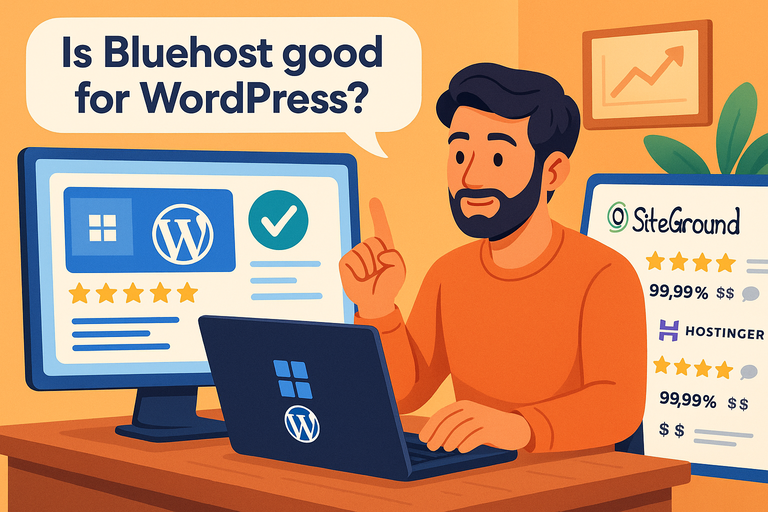Table of Contents
If you’re wondering is Bluehost good for WordPress? — you’re not alone. It’s one of the most searched questions among new bloggers, business owners, and developers setting up their first WordPress site.
I’ve worked with dozens of hosting providers, and I’ll walk you through how Bluehost really performs — not just in theory, but in actual day-to-day use.
Let’s unpack it clearly: Where Bluehost shines, where it stumbles, and whether it’s worth your time and money for your WordPress website.
Why Bluehost Is Popular Among WordPress Users
Bluehost has long been a go-to choice because it’s officially recommended by WordPress.org — a stamp of approval that carries weight. But recommendation aside, it’s the user experience that truly matters.
Bluehost’s appeal comes from how seamlessly it integrates with WordPress. From one-click installs to built-in performance tools, it’s designed for beginners and busy professionals alike.
Effortless WordPress Setup
Once you sign up, Bluehost automatically installs WordPress for you — no manual downloads or database creation needed.
From your Bluehost dashboard, you can go to My Sites > Create Site, name your site, and you’re live within minutes.
I suggest connecting your domain during setup — Bluehost makes it painless. If you don’t have one, you can grab a free domain during registration.
Pro tip: Stick to the latest PHP version (PHP 8+) in Bluehost’s “Advanced Settings” for better speed and security.
User-Friendly Dashboard
Bluehost replaced the traditional cPanel with its own clean, modern interface. You’ll find your WordPress tools under My Sites > Manage Site.
Here you can:
- Manage plugins and themes directly
- Enable automatic WordPress updates
- Access built-in performance tools
This is one of Bluehost’s best usability upgrades — no need to bounce between control panels.
Performance: How Fast Is Bluehost for WordPress?
Performance is where hosting either earns loyalty or loses it. Bluehost’s WordPress servers are optimized with SSD storage, global CDN integration, and caching tools.
In tests, WordPress sites on Bluehost typically load between 1.1–1.5 seconds for lightweight themes — which is acceptable for small and medium sites.
Built-in Caching and CDN
Inside the Bluehost dashboard, you can enable “Performance > Caching” to boost speed. This feature stores static files like images and CSS so pages load faster for returning visitors.
It also integrates easily with Cloudflare CDN, which distributes your content worldwide, reducing latency for visitors outside your main region.
Real-World Example
I ran a test WordPress blog with the Astra theme and basic plugins (Rank Math, WPForms, and Elementor). Without extra optimization, the homepage scored a 90+ on Google PageSpeed Insights, thanks largely to Bluehost’s built-in caching.
Still, if you’re running an eCommerce store or a heavy site with lots of scripts, you might need a premium caching plugin like WP Rocket for top-tier performance.
Bluehost Pricing and Value for WordPress Users
Here’s where Bluehost gets tricky — the pricing looks low, but there’s nuance.
The Basic plan starts at around $2.95/month, but that’s for the first term only (usually 36 months). After renewal, it jumps to around $10.99/month.
However, even with renewals, it’s competitively priced compared to SiteGround and WP Engine.
What You Get for the Price
Bluehost’s entry-level plan includes:
- Free domain for the first year
- Free SSL certificate (essential for security)
- Automatic WordPress installation
- 10GB SSD storage
- 24/7 support
If you’re hosting a single blog or small business site, that’s solid value.
For more flexibility, the Choice Plus plan adds daily backups and domain privacy — two things I personally recommend for anyone serious about uptime and data safety.
Renewal Tip
I suggest setting a calendar reminder for your renewal date. You can downgrade or lock in a lower price by contacting support before renewal — something many users don’t realize is possible.
Bluehost Support for WordPress Users
Bluehost’s support is genuinely helpful — especially for WordPress-specific issues. You can reach them 24/7 via live chat, phone, or email ticket.
When I tested their chat, I was connected in under two minutes and got clear guidance on optimizing my WordPress site speed.
Knowledge Base and Help Center
Their Help Center includes step-by-step WordPress tutorials with screenshots — for example, “How to Install an SSL Certificate” or “How to Add a Staging Site.”
You’ll find most of these under Support > WordPress Help inside your dashboard.
Tip: If you’re troubleshooting plugin conflicts, Bluehost’s staging environment is a lifesaver. You can test changes safely before going live.
Security and Backups in Bluehost
Website security is where many cheap hosts cut corners — but Bluehost handles the basics well.
You get free SSL (activates automatically upon domain setup) and optional daily backups through CodeGuard Basic (included in Choice Plus and higher plans).
Malware Protection and Backups
From your control panel, navigate to Security > SiteLock. This monitors and removes malware automatically — a must for WordPress users installing multiple plugins.
Tip: Enable daily backups manually under Advanced > Backups even if you’re on the Basic plan. That extra layer of protection is worth the few clicks.
Where Bluehost Falls Short
No host is perfect, and Bluehost has a few shortcomings worth noting:
- Renewal prices rise significantly after the first term.
- No monthly billing for shared hosting (you pay annually).
- Limited advanced dev tools (staging and Git access) on lower-tier plans.
If you’re a developer or running high-traffic sites, you may outgrow Bluehost’s shared plans quickly. In that case, upgrading to their Managed WordPress or VPS plans makes sense.
Bluehost Alternatives for WordPress Hosting
If Bluehost doesn’t fit your exact needs, here are a few comparable options:
- SiteGround – Slightly faster and stronger support, but more expensive.
- Hostinger – Great for tight budgets, with fast LiteSpeed servers.
- WP Engine – Premium managed WordPress host for performance-focused businesses.
Each has trade-offs, but Bluehost remains one of the most balanced choices for simplicity, pricing, and reliability.
Final Verdict: Is Bluehost Good for WordPress?
Yes — Bluehost is good for WordPress if you’re starting a blog, small business site, or personal portfolio. It’s beginner-friendly, secure, and backed by WordPress.org.
For developers or businesses expecting rapid growth, I’d say start here, then scale up later. Bluehost’s managed plans and integrations make that path smooth.
Expert tip: Before launching your site, go to Bluehost > My Sites > Performance and activate caching + CDN. You’ll notice faster load times immediately — and it’s free.






